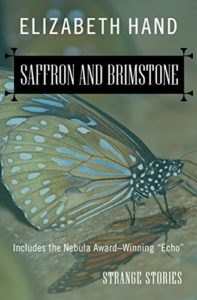I zipped through the eight stories of Saffron and Brimstone in about a day and a half when I was in the hospital and looking for something fantastical to read. The tales — one novella, a quartet of connected short stories, and three other stand-alones — all bring fantastic or horrific elements into the mundane world, sometimes to the characters’ surprise, sometimes not.
The half-titular story, “Cleopatra Brimstone,” is the longest and concerns a gifted young woman who’s an insect researcher, and the delayed consequences of an assault perpetrated on her. “Pavane for a Prince of the Air” relates a free spirit’s death by mundane disease. It captures the way a serious illness seems to collapse the world into a narrow space — whether that’s a hospital room or a home — for the person bearing it and the people closest to them. It is also a sideways commentary on health care for artists in the United States, but mostly it is a portrayal of someone who has always lived by his own rules also dying in his own way, and how that affects the people close to him.
“The Least Trumps” pulls out some neat tricks from a love of Tarot and obscure fantasy novels, with some meditations on a life lived next to fame, obsession, and tattoos. “Wonderwall” shows a tawdrier side of bohemian life, how suffering doesn’t always lead to great art, and how having the resources to pull oneself out of a spiraling gyre can be better for creativity even if it sounds sort of mundane.
The four stories of “The Lost Domain” are “the result of an epistolary friendship that began sometime in the late 1980s… My correspondent and myself have met only a handful of times. We never, ever talk on the phone. We live thousands of miles apart, and never run into each other of the street.” (Author’s Afterword) The four parts — “Kronia,” “Calypso in Berlin,” “Echo,” and “The Saffron Gatherers” — are variations on the theme of people who are immensely important to each other but who seldom meet face to face. Sometimes when they do meet, the consequences are fatal; sometimes they are merely transformative; in one instance, it is not clear whether they do meet or whether the narrator merely thinks they do.
All of the stories in Saffron and Brimstone are lush and immersive, with atmospheres that linger long in my memory. In several of them, bad things happen to male characters immediately after sex; lover beware, I suppose. I liked this better than I liked Black Light because it was not as obvious where the stories were going, and when it was, I liked the characters and settings well enough to follow along anyway.

